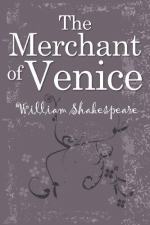|
This section contains 8,539 words (approx. 29 pages at 300 words per page) |

|
SOURCE: "Portia's Ring: Unruly Women and Structures of Exchange in The Merchant of Venice" in Shakespeare Quarterly, Vol. 38, No. 1, Spring, 1987, pp. 19-33.
In the following essay, Newman argues that the "structure of exchange " permeates both economic and romantic transactions in the play; she then explores the means by which power and prestige are gained, particularly by Portia, through the exchanging of gifts.
The merchant of Shakespeare's title is ambiguous; it applies literally to Antonio, but also characterizes Shylock, and indeed all the play's action, not only the "bond" plot, but the love plot as well. The exchange of goods, whether they be "rich lading wrack'd on the narrow seas" (III.i.3) or women, characterizes the play's action. Readers have often remarked the language of commerce that characterizes the Venetian world of the Rialto where even a church, "the holy edifice of stone," would remind Christian merchants "of dangerous...
|
This section contains 8,539 words (approx. 29 pages at 300 words per page) |

|


